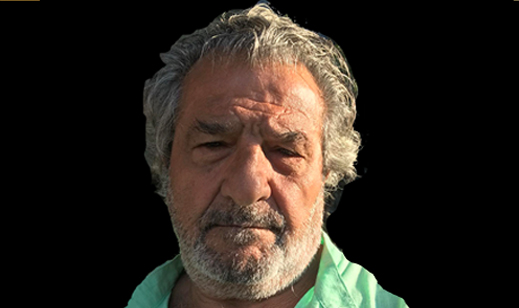
Amwaj Media \ Muhammad Jawad Adib
- Muhammad Jawad Adib is an academic and researcher on social and religious issues. He specializes in … Full Bio
The crackdown on anti-establishment protests in Iran has led prominent Shiite clerics in both Iran and Iraq to call on the Islamic Republic to halt the violence and listen to popular demands. In particular, the execution of individuals detained in connection with the unrest has sparked criticism from high-ranking clergymen in the holy city of Qom, indicating a shift in relations between the seminary and the state.
The criticisms raised by clerics focus on what is denounced as an extremist reading of the Islamic jurisprudential notion of moharebeh. Essentially meaning “waging war against God,” the concept has been used as a legal basis for the issuing of death sentences in connection with the unrest, leading some to allege that there is an attempt to strike terror in the hearts of protesters.
Criticisms of the use of jurisprudential notions
Mohsen Shekari, a 23-year-old man detained during the recent protests in Iran, was on Dec. 8 executed on the charge of “waging war against God.” The execution triggered a major public backlash that came to involve prominent clergymen. For instance, in the days after Shekari’s death, Ayatollah Mohammad Ali Ayazi—a senior member of the Assembly of Qom Seminary Scholars and Researchers—stated in an interview that “there is a clear definition of moharebeh in [Islamic] jurisprudence. Moharebeh means employing a weapon with the intention of terrifying [people] and waging war against God and the Prophet [Muhammad].”
Main Shiite seminaries, shrines in Iran
Millions of pilgrims visit Mashhad each year, while Qom is home to the country’s top seminaries.

Rejecting the notion that all street protests can be considered as moharebeh, Ayazi added, “When someone has the right to protest against the status quo and the police try to obstruct their protest, we cannot call it an act of moharebeh if they want to defend their rights.” Moreover, he implied that executions over the charge of moharebeh without the support of public opinion might be instances of the jurisprudential notion of ikhafa; namely to induce a sense of insecurity among the public.
Three days after Ayazi’s comments, on Dec. 14, Ayatollah Mohammad Ali Gerami raised similar objections in an interview with Jamaran news site, “The Quran has specified three rulings for someone who perpetrates an act of moharebeh: execution, amputation of hands and legs, and exile.” Gerami went on to quote Ayatollah Ruhollah Khomeini—the founder of the Islamic Republic—as saying that “if perpetrators of moharebeh have not killed anyone or stolen anyone’s property, then they definitely cannot be sentenced to death. They can be sentenced to exile instead.”
Pointing out other instances of apparent extremism in rulings, Gerami went on to criticize the judiciary’s apparent expansion of the scope of the jurisprudential notion of “corruption on Earth,” saying that it does not include dissemination of false information. Of note, in addition to moharebeh, “corruption on Earth” is a common legal charge leveled against dissidents in Iran.
Structural criticisms
Iranian criminal law is based on Shiite jurisprudence, which indicates that a judge should be a mujtahid, meaning an authoritative interpreter of Islamic law. The judiciary, however, has long used non-mujtahid judges due to the shortage of mujtahids. Against the backdrop of the recent string of death sentences, there are now criticisms that non-mujtahid judges are neither sufficiently astute to issue rulings nor independent in their juridical opinions. Critics include prominent clerics such as Ayatollah Mostafa Mohaqeq Damad, who has lamented that sentences are being handed down by individuals without sufficient knowledge of judicial procedures and the intricacies of the judicial system.
In a rare Dec. 15 open letter addressed to judges, Mohaqeq Damad—head of the Department of Law at Shahid Beheshti University in Tehran and former chief of the General Inspection Organization of Iran—urged deeper scrutiny ahead of the issuing of sentences. The top cleric also ominously warned, “History will never forget errors and negligence over blood and illegitimate punishments.”
Criticism of the manner in which protesters are being prosecuted has also been expressed by other senior figures affiliated with the state. Ayatollah Morteza Moqtadaie, a mujtahid and member of the Assembly of Experts—the council tasked with supervising the supreme leader and appointing his successor—stated in a Dec. 11 interview that moharebeh only involves the use of a weapon, as opposed to, for example, a piece of wood. A previous head of the Qom Seminary and the supreme court—as well as an ex-prosecutor-general—Moqtadaei also posited that a perpetrator of moharebeh is someone who displays signs of preparation for war. Moreover, he asserted that not all of perpetrators of moharebeh can be sentenced to death, arguing that execution sentences may only be handed to those who have committed murder.
2022-23 protests in Iran
Main centers of unrest sparked by the Sept. 2022 death of a young woman detained by morality police.

In this vein, Sheikh Hossein Ansari Rad—a former three-term Reformist lawmaker—on Dec. 22 sent a public letter to the supreme leader in which he criticized Ayatollah Ali Khamenei’s manner of governance. Ansari Rad charged that the “Islamic Republic has failed in all economic, political, social and cultural aspects,” warning that “a big explosion will happen” should the government continue its current approach and ignore people’s demands.
Aside from such direct criticisms, some prominent clerics in Qom have in response to requests for their religious edicts concerning moharebeh insisted on the divergence of their views from the judiciary’s current practices. For instance, in one edict, Ayatollah Asadollah Bayat Zanjani wrote, “The death penalty applies to a perpetrator of moharebeh only when they commit murder; otherwise, such a penalty is illegitimate.”
Prominent Ayatollah Naser Makarem Shirazi also offered a detailed explanation on Dec. 18 in which he underscored the necessity of proportionality between the actions of a perpetrator of moharebeh and the punishment, saying, “If they brandish a weapon against people without shedding any blood or stealing anything, then they should be exiled to another city.”
Expanding criticisms
Criticism by senior Shiite clerics of the way death sentences have been issued is not unprecedented in the history of the Islamic Republic. In the decade following the 1979 Islamic Revolution, executions took place which raised objections by Grand Ayatollah Hussein-Ali Montazeri—the designated successor of Ayatollah Khomeini at the time—who called such actions unlawful and against the tenets of Islam. The criticism led to the sidelining of the top cleric and eventual house arrest until his death in 2009.
In a clear sign of the current division and growing dissent in Qom, the pro-government Society of Seminary Teachers of Qom issued a statement on Dec. 24 which slammed clergymen who urge a halt to executions of protesters, calling them “politically bankrupt clerics.”
Importantly, the criticism from Qom has also spread to the prominent Shiite seminary in the holy city of Najaf in Iraq. For instance, Iranian pro-reform cleric Mohammad Ashrafi Esfahani recently quoted Grand Ayatollah Ali al-Sistani as saying, “I am fully aware of what is happening in Iran, and I am very concerned about the circumstances of Iran.” As head of the Najaf Seminary, Sistani is the supreme Shiite religious authority in Iraq. In response to Ashrafi Esfehani’s request for Sistani to issue a statement on the recent events in Iran, the latter stated, “I have sent messages on occasion, but unfortunately found no receptive ears.” Speaking to Amwaj.media, several prominent seminary instructors in Najaf confirmed the quote attributed to Sistani, also expressing their own concerns about the situation in Iran.
Rival Shiite centers of learning
Najaf in Iraq and Qom in Iran have long competed for pre-eminence in Shiite Islam.

The Najaf Seminary has a history of strong caution towards the implementation of punishments meted out under the rubric of Islamic law. The objection against the manner in which the Iranian judiciary is operating was on clear display in 2017, when the late former Iranian chief justice Ayatollah Mahmoud Hashemi failed to secure any meetings with Sistani or other top clerics during a trip to Iraq. Such criticisms may also be viewed as attempts to reclaim the seminary’s independence from external political influence.
Abbas Abdi, a prominent Iranian Reformist journalist and political activist, recently predicted that criticisms against the Islamic Republic would eventually also be raised from the Qom Seminary. In an interview, he described clerics as part of Iranian society who cannot leave the country and at the end of the day should coexist with the people. In Abdi’s view, the return of clerics to their original independent position would likely be extremely helpful in guiding the authorities towards the path of reform as it would indicate the government’s loss of its last remaining support base. He explained, “Clerics supported the government in earlier protests, but in this case, and even in the event of the [Islamic State group’s Oct. 26, 2022] terrorist operation against the pilgrims of Shah Cheragh [in the city of Shiraz], they were relatively silent,” concluding, “And they will not stay silent in subsequent events.”
Iran-Iraq, Protest, Demonstrations, Shiite Islam, Judiciary, Execution
Amwwaj media




